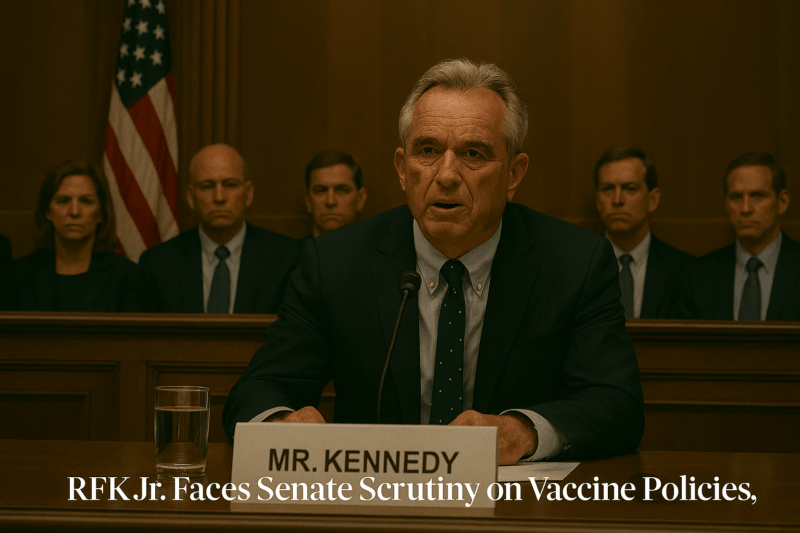A Controversial Alliance
On September 6, 2025, President Donald Trump reaffirmed his support for Health and Human Services Secretary Robert F. Kennedy Jr., despite Kennedy’s radical vaccine policy changes, which include slashing research funding and limiting COVID-19 shot access. This backing, reported by Reuters, has ignited fierce debate over public health risks and political consequences, highlighting Trump’s willingness to challenge established systems amid bipartisan criticism.
Human Toll of Vaccine Policy Shifts
Kennedy’s policies, including ousting the CDC director and restricting vaccine access, threaten vulnerable populations. In 2025, measles cases hit a 20-year high, with 1,200 U.S. cases reported by June, per the CDC, linked to declining vaccination rates. Unvaccinated children and immunocompromised individuals face heightened risks, while families like those in Kentucky, mourning two pertussis deaths, feel the impact. Public trust in vaccines, already fragile among 41% of Republicans per Reuters/Ipsos, wanes further, potentially exacerbating outbreaks.
Facts and Figures of the Controversy
Kennedy, appointed after endorsing Trump in 2024, has slashed $500 million in mRNA vaccine research and limited COVID-19 shots to those over 65 or with health conditions. A Yale study (2020-2022) credits vaccines with preventing 18.5 million hospitalizations and 3.2 million deaths. Trump, who championed Operation Warp Speed, faces political peril if outbreaks surge, yet supports Kennedy, calling him “different” on September 4, 2025. A Fabrizio-Ward poll shows 89% of voters, including 81% of Trump supporters, want vaccine recommendations from experts, not politicians.
Broader Context: Public Health vs. Political Strategy
Trump’s alliance with Kennedy, fueled by the Make America Healthy Again movement, reflects a broader anti-establishment push, seen in his 2025 moves against academia and media. Nationally, vaccine hesitancy grew, with only 41% of Republicans deeming childhood vaccines “very safe” in 2025, down from 57% in 2020. Globally, countries like Canada face similar anti-vaccine sentiment, with 2024 protests against mandates. Critics, like Yale’s Gregg Gonsalves, warn of “disastrous” health consequences, while Trump’s base, skeptical of mandates, applauds Kennedy. Florida’s 2025 plan to end school vaccine requirements amplifies the debate.
Specific Policy Impacts and Reactions
Kennedy’s dismissal of CDC Director Susan Monarez, who resisted his vaccine advisory changes, and his restrictions on mRNA vaccines have drawn bipartisan ire. At a September 4 Senate hearing, Senators Bill Cassidy and John Barrasso, both doctors, criticized Kennedy, citing public support for expert-led vaccine policy. Vice President JD Vance defended Kennedy on X, dismissing critics. Trump’s social media call for vaccine efficacy proof contrasts with existing data, reflecting his ambivalence and desire for Operation Warp Speed credit.
What Lies Ahead: Health Risks and Political Calculus
Kennedy’s ongoing changes, including a vaccine advisory panel stacked with skeptics, could further erode vaccination rates, risking outbreaks like the 2019 measles epidemic (1,282 U.S. cases). Legal challenges, similar to a 2024 NIH funding restoration lawsuit, may arise if policies violate public health mandates. Globally, nations like Germany enforce strict vaccine policies, offering a contrast. Trump’s support for Kennedy may waver if political fallout grows, as Marc Short notes Trump’s tendency to “cut bait” when embarrassed.
Conclusion: A High-Stakes Gamble
Trump’s backing of Kennedy’s vaccine policies, despite clear health risks, underscores a volatile mix of ideology and politics. As public health experts warn of dire consequences and bipartisan criticism mounts, the administration’s path forward will test its commitment to science versus populist appeal. Protecting American wellness demands balancing trust, evidence, and leadership to avert preventable crises.




